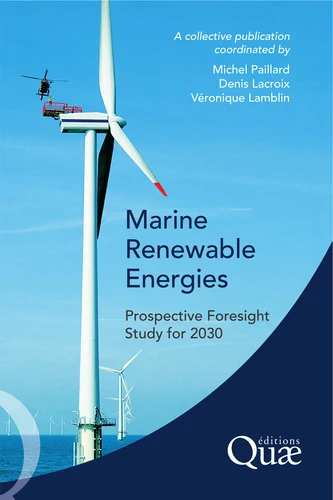Marine Renewable Energies. Prospective Foresight Study for 2030
Par :Formats :
Disponible dans votre compte client Decitre ou Furet du Nord dès validation de votre commande. Le format Multi-format est :
- Pour les liseuses autres que Vivlio, vous devez utiliser le logiciel Adobe Digital Edition. Non compatible avec la lecture sur les liseuses Kindle, Remarkable et Sony
 , qui est-ce ?
, qui est-ce ?Notre partenaire de plateforme de lecture numérique où vous retrouverez l'ensemble de vos ebooks gratuitement
Pour en savoir plus sur nos ebooks, consultez notre aide en ligne ici
- Nombre de pages320
- FormatMulti-format
- ISBN978-2-7592-0184-6
- EAN9782759201846
- Date de parution12/02/2009
- Protection num.NC
- Infos supplémentairesMulti-format incluant PDF sans p...
- ÉditeurQuae
Résumé
The ocean is a huge reservoir of renewable energy sources, such as wind, currents, tides, waves, marine biomass, thermal energy, osmotic power, and so on. Like other maritime nations in Europe, France enjoys significant potential to develop these energy sources, especially overseas. In March 2007, Ifremer's chairman launched a prospective foresight study on these energies for the time horizon of 2030.
With support from the Futuribles consulting group, twenty French partners representing the main stakeholders in the sector carried out this work. Their objective was to identify the technologies, specify the socio-economic prerequisites for them to emerge and be competitive and assess their respective impacts on power sources and the environment. What was learned from this study can be applied well beyond France, at a time when a European maritime strategy is taking shape.
With support from the Futuribles consulting group, twenty French partners representing the main stakeholders in the sector carried out this work. Their objective was to identify the technologies, specify the socio-economic prerequisites for them to emerge and be competitive and assess their respective impacts on power sources and the environment. What was learned from this study can be applied well beyond France, at a time when a European maritime strategy is taking shape.
The ocean is a huge reservoir of renewable energy sources, such as wind, currents, tides, waves, marine biomass, thermal energy, osmotic power, and so on. Like other maritime nations in Europe, France enjoys significant potential to develop these energy sources, especially overseas. In March 2007, Ifremer's chairman launched a prospective foresight study on these energies for the time horizon of 2030.
With support from the Futuribles consulting group, twenty French partners representing the main stakeholders in the sector carried out this work. Their objective was to identify the technologies, specify the socio-economic prerequisites for them to emerge and be competitive and assess their respective impacts on power sources and the environment. What was learned from this study can be applied well beyond France, at a time when a European maritime strategy is taking shape.
With support from the Futuribles consulting group, twenty French partners representing the main stakeholders in the sector carried out this work. Their objective was to identify the technologies, specify the socio-economic prerequisites for them to emerge and be competitive and assess their respective impacts on power sources and the environment. What was learned from this study can be applied well beyond France, at a time when a European maritime strategy is taking shape.



